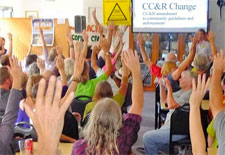*New Case Law
As is a common occurrence for HOA Boards, there is often difficulty in obtaining the HOA members’ consent that is required for taking such actions as amending the HOA’s governing documents or undertaking capital improvements. Failure to obtain the members’ consent–whether it is a result of member apathy or disagreement with the Board’s position–often results in wasted resources that were expended in conducting the election procedures required under California law. HOA Boards are therefore always looking for ways in which they can educate the members on the Board’s position and the reasons why the Board believes that the membership should vote a particular way in the upcoming election.
HOA Boards may therefore seek to utilize media outlets such as the HOA’s website and newsletters, as well as posting notices in HOA common areas, in an effort to garnish member support for the Board’s position. However, when such “advocacy” efforts are made as part of an election campaign, California Civil Code Sections 1363.03(a)(1) and (a)(2) require the HOA to provide equal access to its media outlets and common areas to all members who may be advocating opposing points of view. Where the HOA fails to provide such equal access, Civil Code Section 1363.09(a) allows a court to void the election results and even impose civil penalties.
This was the issue in the recent case of Wittenberg v. Beachwalk Homeowners Association, where the court held that a HOA’s election results could be invalidated based upon the fact that the HOA Board had failed its duty to provide homeowners with the type of equal access contemplated by the Civil Code…
The HOA Board in Wittenberg had made repeated efforts to pass an amendment to the HOA’s CC&Rs. The Board, through the use of the HOA’s web site and newsletter, “encouraged” the members “to vote yes for the [proposed amendment].” However, the Board had “at least on one occasion…outright refused to publish a [member’s] article in the newsletter opposing an advocacy article the [B]oard had published” regarding the proposed amendment. In interpreting the Civil Code’s requirements, the court in Wittenberg opined that the Board was required to “either give equal access to opposing viewpoints, or forego the use of association media to advocate its viewpoint.”
The court in Wittenberg also held that the Board had violated Civil Code Section 1363.03(a)(2) by denying a homeowner’s request to utilize common areas, free of charge, for the purpose of holding a political rally relevant to the election. Notably, the homeowner’s request pertained to the first two election campaigns, not to the third election in which the proposed amendment was finally approved. The Board had sent out newsletters and posted its position on the HOA’s website (1) reiterating the Board’s position as to why the membership should vote yes for the proposed amendment, and (2) threatening to hold multiple elections until the proposed amendment ultimately passed. On these facts, the court in Wittenberg held that the Board had “tied the two prior elections” together with the third election so that all three elections–and their respective campaigns–should be treated as one. The HOA’s refusal to grant the homeowner free access to common areas in the first two election campaigns could therefore provide a basis for invalidating the results of the third election in which the proposed amendment was finally approved.
|
This case serves as another important example of a Board’s fiduciary duties to strictly adhere to the Civil Code’s requirements pertaining to election campaigns. Those requirements were enacted in order to “guarantee that basic democratic principles are in place during elections, which had been previously contaminated by manipulation, oppression and intimidation of members, as well as outright fraud.” HOA Boards should therefore be careful with the ways in which they may be advocating the Board’s view on a proposed action that is a the basis for an upcoming election, and how the HOA then responds to members’ desires to advocate opposing points of view. |
 HOA Lawyer Blog
HOA Lawyer Blog

